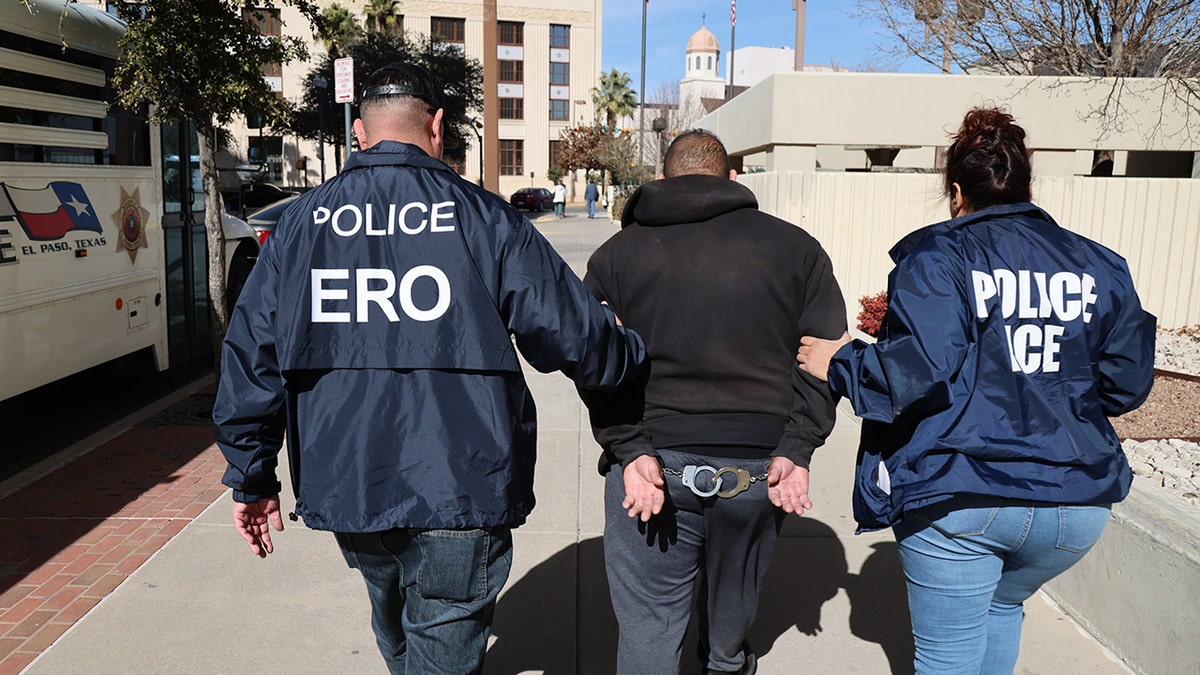Two employees at an Ontario surgery center have been indicted by a federal grand jury for allegedly assaulting and obstructing U.S. immigration officers who were attempting to detain a Honduran national in the country illegally.
The charges, which involve felony counts of assaulting, resisting, and impeding federal officers, have drawn national attention to the contentious issue of immigration enforcement, particularly in healthcare settings.
Jose de Jesus Ortega, 38, from Highland, and Danielle Nadine Davila, 33, from Corona, were indicted on August 27 following an incident that occurred on July 8.
The two were charged in connection with their interference during a routine immigration operation conducted by U.S. Immigration and Customs Enforcement (ICE) officers in Ontario, California.
According to the Justice Department’s account of the events, ICE officers were carrying out roving immigration operations when they encountered three men in a truck.
The men were pursued by the officers, who were wearing law enforcement vests and driving an unmarked vehicle. The vehicle made a quick turn into the parking lot of a surgery center in Ontario, and the three men exited the truck. Two of the men fled on foot.
One of the fleeing men, later identified by the Justice Department as a Honduran national who was in the U.S. illegally, was partially detained by one of the officers near the surgery center’s front entrance. However, the man resisted and pulled away from the officer, causing both of them to fall to the ground.
At that point, medical staff at the surgery center intervened. One medical staffer assisted the Honduran man to his feet and pulled him away from the ICE officer. The man fled into the surgery center, with the officer in pursuit. Eventually, the officer stopped the man inside the facility.

It was at this moment that Ortega and Davila, both of whom were dressed in medical scrubs, allegedly interfered with the arrest.
According to the DOJ, Davila placed herself in between the officer and the migrant, pushing the ICE officer while shouting, “Let him go!” and “Get out!” Ortega then allegedly impeded the officer’s actions by grabbing his arm and vest.
The officers, now realizing they were encountering significant resistance, radioed for backup. A second ICE officer arrived at the surgery center to find multiple staff members restraining the first officer. Eventually, after considerable delay, the officers were able to detain and handcuff the Honduran man, escorting him from the facility.
The incident was captured on video, which reportedly shows the officers struggling to complete the arrest while being obstructed by the medical staff.
As a result of the altercation, Ortega and Davila were charged with one felony count each for assaulting, resisting, and impeding federal officers in the performance of their official duties. If convicted, they face a maximum penalty of up to eight years in federal prison.
During a press conference following their arrests, Ortega made an assertion about the center’s protocol. He claimed that the medical staff had been instructed to request identification and warrants before allowing law enforcement into the facility. However, this statement has not been corroborated by other sources.
The DOJ’s release of the video and their account of the incident indicate that Ortega and Davila played an active role in preventing the ICE officers from doing their job, which may be the basis of the charges.
This case highlights the ongoing tension between local policies, immigration enforcement, and healthcare facilities. ICE has long faced scrutiny for carrying out immigration enforcement in and around medical centers, which some argue can interfere with patient care and place vulnerable populations at risk.

Immigrant rights advocates have pointed to this incident as part of a broader pattern of concern over how ICE conducts operations, particularly in sensitive spaces like hospitals and surgery centers.
Some medical professionals, including the staff at the Ontario surgery center, argue that enforcing immigration laws in these settings disrupts essential healthcare services and violates the sanctity of medical spaces.
However, federal authorities have maintained that their operations are necessary to uphold U.S. immigration laws. In this particular instance, the DOJ emphasized that the actions taken by Ortega and Davila to impede the officers’ work may have put public safety at risk.
The Honduran migrant at the center of the incident was eventually detained and taken to the Adelanto detention facility, where he chose to self-deport. The man’s actions, combined with the interference from the surgery center staff, have raised questions about how immigration laws are applied in real-time by federal officers.
The situation has also brought attention to the broader issue of immigration enforcement priorities. Critics of ICE argue that resources should be directed toward detaining individuals who pose significant security threats, rather than apprehending workers who have lived in the country for many years.
The indictment of Ortega and Davila comes at a time of heightened political divisions over immigration enforcement. While the Trump administration’s hardline stance on immigration made headlines for years, the Biden administration has continued many of the policies established by its predecessor.
As public opinion on immigration continues to divide along partisan lines, incidents like the one in Ontario serve as flashpoints in this ongoing debate.
On one side of the issue, Republicans have largely supported aggressive immigration enforcement, calling for tougher policies to curb illegal immigration.

The arrest of the Honduran man and the subsequent indictment of two medical workers who allegedly interfered with federal officers is being hailed by some as a necessary step toward securing the nation’s borders and upholding the law.
On the other side, Democrats and immigrant rights groups have called for more leniency and understanding, particularly in healthcare contexts. For them, the actions of Ortega and Davila were an example of individuals stepping in to protect vulnerable migrants from what they consider to be overreaching government power.
The intersection of immigration law and patient rights remains a significant source of conflict.
This case also serves as a reminder of the broader issues surrounding immigration enforcement. The Trump administration made deportation and detainment a central focus of its immigration agenda, and the Biden administration, while somewhat more lenient, has continued with similar enforcement tactics.
As ICE continues to conduct operations in and around sensitive spaces like hospitals and clinics, questions remain about the balance between securing the border and protecting the rights of people seeking medical care.
Critics have argued that immigration enforcement in these environments can contribute to fear and distrust in communities, particularly among immigrant populations that rely on healthcare services.
The Ontario incident shows the growing tension between law enforcement priorities and the rights of individuals within these spaces. Ortega and Davila’s involvement in blocking federal officers has drawn attention to the complexities of immigration enforcement, especially in environments where legal and moral considerations intersect.
As the case moves forward to trial in October, the political and legal implications are likely to extend well beyond the two indicted workers. The incident could fuel further debate about ICE’s operations in medical spaces, the extent to which federal officers should have the right to detain people in those settings, and the legal responsibilities of medical staff who choose to intervene.

While the focus will likely remain on the charges against Ortega and Davila, this case could become a larger flashpoint in the national debate over immigration policy and the balance between security and civil liberties.
The indictment of two employees at an Ontario surgery center for allegedly impeding an ICE officer’s attempt to detain an illegal migrant has ignited a national conversation about the intersection of immigration enforcement and healthcare.
While the case remains under legal review, the charges against Jose de Jesus Ortega and Danielle Nadine Davila underscore the growing tension between the enforcement of immigration laws and the protection of civil liberties in sensitive spaces.
As the case progresses, it will likely continue to draw attention from both immigration enforcement advocates and those calling for more compassionate immigration policies.
With the trial set for October 6, the outcome of this case could have significant implications for future immigration enforcement in healthcare settings, the legal responsibilities of medical staff, and the broader national debate over immigration.




